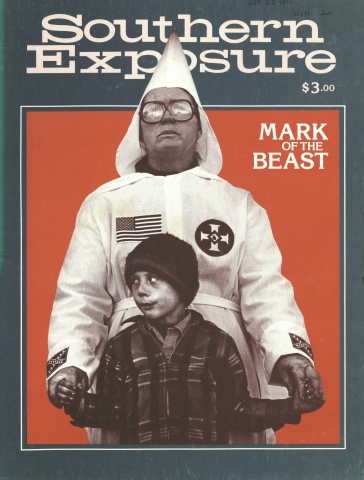KKK vs. Labor: A Sampler

This article originally appeared in Southern Exposure Vol. 8 No. 2, "Mark of the Beast." Find more from that issue here.
The following article contains anti-Black racial slurs.
When the CIO announced in 1935 that it was coming South to organize the unorganized whites and blacks in the same unions the KKK replied, "We shall fight horror with horror!" In 1934, there was the case of Fred Norman. He and his wife were trying to help the citrus workers around Lakeland, Florida, to form a union. One night a car stopped at the Norman home; Norman was asked to go with [ the men] “to identify the body of a Negro.” He entered the car; it drove away - and Frank Norman hasn't been seen or heard from since. Evidence purportedly linking Klan kleagle Fred Bass to the disappearance of Norman was twice presented to a grand jury, but the jury did not return an indictment. . . .
1939, Anderson, South Carolina - “They said they were beating me because I didn’t give my wife enough money and because I beat my five-year-old boy; but I have never been married and have no children, ” said one of several union men flogged by the Klan.
March 31, 1942, Holt, Alabama - In a whirlwind climax to weeks of flogging and terror, the Klan planted fiery crosses in front of the CIO Steelworkers Organizing Committee hall and in front of the union leader’s home, on the eve of an NLRB election at the Tennessee Coal, Iron and Railroad Company (a U.S. Steel subsidiary).
September 15, 1943, Apopka, Florida - “Hey, you nigger, we’ve got your union button and know you ’re a CIO member!” yelled one of the Klansmen in the parade of masked men who drove through the Negro section on the eve of an NLRB election at the Phillips Citrus Packing House. A number of soldiers (from the North) stopped several carloads of Klansmen and commanded them to “Take those damned hoods off! You ought to be saving that gasoline for war use!”
— Stetson Kennedy, Southern Exposure, 1946
Tags
Stetson Kennedy
We tend to think of Stetson Kennedy as a sort of godfather, from whose pioneering book Southern Exposure we got not only our name but a number of excerpts which have appeared in our pages. Kennedy was part of the brave band of Southerners who stormed the ramparts in the ’30s and ’40s under such standards as the Southern Conference for Human Welfare, Southern Negro Youth Congress, Highlander Folk School and the CIO’s Operation Dixie.